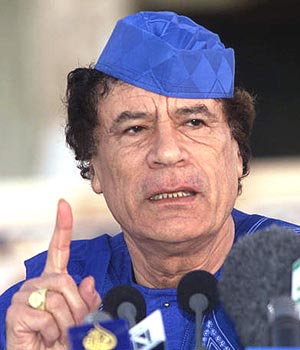In three African countries, it's Gaddafi to the rescue
 Tripoli - Dressed in a traditional Libyan brown cap and cloak punctuated by a broach in the shape of the African continent, Moamer Gaddafi looked completely in his element rushing from one conflict-beset African country to the next last week.
Tripoli - Dressed in a traditional Libyan brown cap and cloak punctuated by a broach in the shape of the African continent, Moamer Gaddafi looked completely in his element rushing from one conflict-beset African country to the next last week.
On Friday, Libya's 66-year-old "Brother Leader" triumphantly returned to the Niger capital, Niamey, with six hostages whose release he had just secured from the rebel Movement of the Niger People for Justice.
Niger's President Mamdou Tandja had asked Gaddafi to intercede to break a stalemate that had dragged on since the hostages were captured in June 2007.
It was a dramatic ending to Gaddafi's lightning tour of three African countries in five days in his capacity as temporary head of the African Union (AU).
Gaddafi had traveled to Niger via the West African country of Guinea-Bissau, where soldiers on March 2 had assassinated the president, Joao Bernardo Vieira, in his palace after an explosion killed the head of the armed forces and Vieira's chief political rival, General Batista Tagme Na Waie.
During his short visit, Gaddafi said that polls to elect a successor to the assassinated president may need to be delayed.
"Perhaps the 60-day timescale specified under the constitution will not be sufficient to organise presidential elections," Gaddafi said at the airport at the end of a two-hour visit to the capital, Bissau.
The AU and the Community of Sahel-Saharan States would send election observers and would launch their own inquiries into the twin killings that shook the small West African country at the beginning of the month, Gaddafi added.
In Mauritania, where he was greeted by cheering crowds holding placards bearing his likeness, he announced that presidential elections would take place as planned on June 6.
AU sanctions on the military junta that deposed the country's first democratically elected president, Sidi Ould Cheikh Abdallahi, last August would not be implemented so long as the elections take place as scheduled.
"The problem is over," Gaddafi said. "The case is closed."
The AU imposed sanctions on Mauritania in February, including a travel ban and a freeze of bank assets on the members of the junta, and called for "an immediate return to constitutional order."
Gaddafi was elected head of the AU last month, a position long sought by the man who has tried to get the AU to come together in a "United States of Africa."
The Libyan leader has increasingly turned south in frustration with his peers in the Arab League.
Last year, Gaddafi criticized his fellow Arab leaders at the annual summit of the Arab League for doing nothing in 2003 when the US invaded Iraq, and for not getting behind his plan to unite Israelis and Palestinians in a new, democratic country he has suggested could be called "Isratine."
"We hate each other, we wish ill for each other, and our intelligence services conspire against each other," Gaddafi told presidents of 22 Arabic-speaking countries last year. "We are our own enemy."
"Your turn is next," he warned delegates, who had perhaps grown used to his annual excoriations.
"Our blood and our language may be one, but there is nothing that can unite us," Gaddafi said.
Arab leaders could not be immediately reached for comment on whether they would allow Gaddafi to settle the Middle East's problems single-handedly after seeing his success in Africa. (dpa)